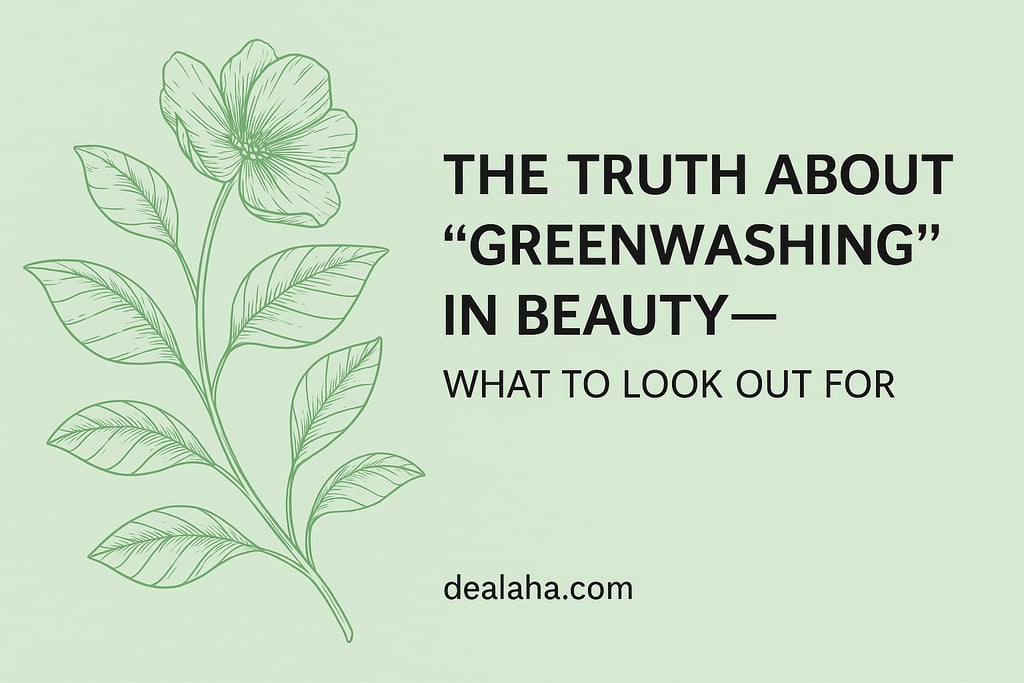🌿 The Truth About “Greenwashing” in Beauty — What to Look Out For
Greenwashing is one of the biggest problems plaguing the clean beauty industry today. As more consumers demand transparency, brands are rushing to look “natural” — without necessarily being honest. But how can you tell the difference between real clean beauty and clever marketing?
SKINCARE & CLEAN BEAUTYWHAT WE RECOMMEND
6/17/20253 min read


🌿 The Truth About “Greenwashing” in Beauty — What to Look Out For
Greenwashing is one of the biggest problems plaguing the clean beauty industry today. As more consumers demand transparency, brands are rushing to look “natural” — without necessarily being honest. But how can you tell the difference between real clean beauty and clever marketing?
In this guide, we’ll break down:
What greenwashing actually is
Common tactics used by brands
How to spot red flags
What certifications actually mean
Trusted clean beauty brands to shop in 2025
Let’s dive in.
💭 What Is Greenwashing in Beauty?
Greenwashing refers to the practice of misleading consumers into believing a product is environmentally friendly or non-toxic — when it’s not.
In beauty, this often means:
Using vague labels like “clean,” “green,” “pure,” or “eco” with no real standards behind them
Highlighting one “hero” natural ingredient while ignoring a list of synthetic or irritating others
Designing packaging to look natural (green colors, leaves, minimalism) to give a clean impression
📌 Example: A shampoo bottle says “Made with Organic Aloe Vera” — but the full formula also includes sulfates, parabens, and artificial fragrances. That’s greenwashing.
⚠️ Why Greenwashing Is a Serious Problem
With billions spent on skincare and makeup annually, consumers deserve to know what they’re paying for. Greenwashing creates:
False trust in unqualified brands
Confusion between real clean beauty and marketing fluff
Barriers for genuinely transparent companies trying to do better
In a 2023 study by Cosmetics Design, over 50% of consumers said they were unsure how to verify a brand’s “clean” claims — and that’s a big issue.
🚩 7 Common Greenwashing Tactics to Watch Out For
Buzzwords Without Standards
Words like “natural,” “non-toxic,” or “safe” sound good, but they’re often unregulated.Hidden Ingredient Lists
If a product uses vague terms like “fragrance” or doesn’t show the full INCI list, be wary.Nature-Inspired Packaging
Just because there’s a leaf on the bottle doesn’t mean it’s green inside.“Free From” Lists That Mislead
“Paraben-free” doesn’t mean the rest of the formula is clean. Always look at what is included.Minimal Reformulation
Brands may launch a “clean” line but still use questionable practices across their core range.Lack of Certification
If a product claims to be organic but lacks any third-party validation (like USDA or COSMOS), it’s worth questioning.Vague Environmental Claims
“Eco-packaging” can mean recycled, recyclable, or biodegradable — each with very different impacts. Clarity matters.
🔍 Real Clean Beauty: What to Look For Instead
To avoid falling for greenwashing, focus on these trust signals:
✅ Ingredient Transparency
Look for brands that list full INCI names, explain each ingredient’s purpose, and avoid “fragrance blend” or “parfum.”
✅ Third-Party Certifications
Certifications aren’t everything, but they help. Some of the most respected include:
EWG Verified
USDA Organic
COSMOS Organic
Leaping Bunny (cruelty-free)
Ecocert
Vegan Society
✅ Sustainability with Substance
Look for companies that share lifecycle impacts, recyclable packaging info, refill programs, and carbon offset initiatives.
✅ Brand Education
Genuine clean brands invest in educating consumers — not just selling products.
💚 Clean Beauty Brands That Don’t Greenwash (2025 Picks)
These brands offer transparency, sustainability, and ingredients you can trust:
ILIA Beauty
Known for full ingredient transparency, skin-centric formulas, and eco-conscious packaging.RMS Beauty
Uses raw, food-grade ingredients with minimal processing for truly clean formulations.Mukti Organics
Certified organic, made in Australia with native botanicals and sustainable practices.100% Pure
Offers fruit-pigmented makeup with complete INCI lists and a strong commitment to clean beauty.Ere Perez
A vegan, multifunctional makeup line that combines ethics with high performance.Etude House (PinknBlossom)
Fragrance-free, dermatologist-tested skincare ideal for sensitive or reactive skin.
🔗 Want links with exclusive offers? Check our affiliate picks at dealaha.com/clean-beauty-guide
Bạn muốn mình chuyển đoạn này thành caption ngắn cho Instagram/Facebook không?
💬 Final Thoughts: Be a Conscious Consumer
Greenwashing won’t go away anytime soon — but you can shop smarter.
By understanding the signs and asking the right questions, you support brands that truly value your health, your skin, and the planet. And in doing so, you help push the beauty industry toward a more honest, sustainable future.
🛍️ Ready to shop real clean?
Explore our expert-tested beauty picks → dealaha.com
Quality You Can Trust
Discover handpicked, high-quality products that support a healthier, more intentional lifestyle.
Contact
Stay in the Loop
© 2025 Dealaha™ All rights reserved.
